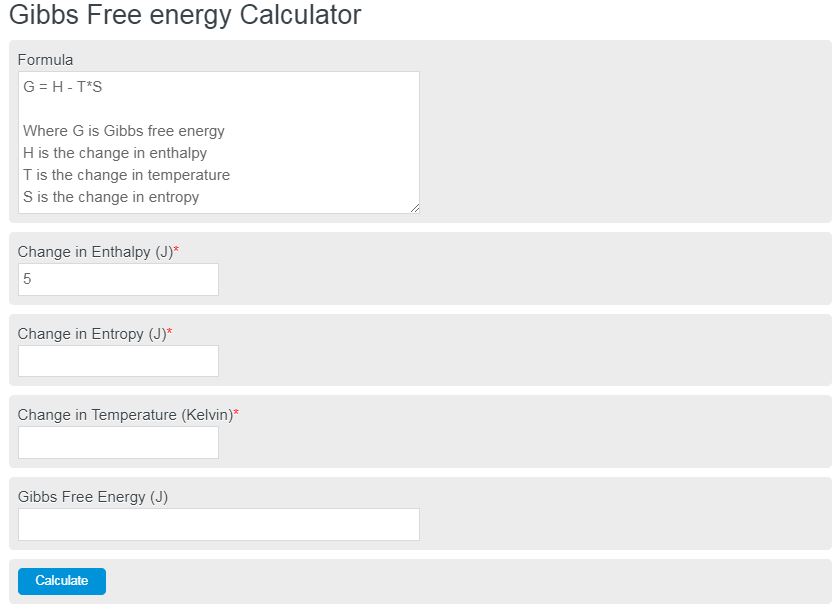Enter the change in enthalpy, change in entropy, and change in temperature into this Gibbs Free Energy Calculator. Gibbs free energy is an often used thermodynamic property to determine whether a reaction will occur spontaneously.
- Specific Heat Calculator
- Enthalpy Calculator
- Coulomb’s Law Calculator
- Ideal Gas Law Calculator
- Heat of Fusion Calculator
- Standard Free Reaction Energy Calculator
- Fermi Energy Calculator
Gibbs Free Energy Formula
The following formula is used in the Gibbs free energy calculator above:
G(p,T) = H - TS
- Where G is Gibbs free energy
- H is the change in enthalpy
- T is the change in temperature
- S is the change in entropy
To calculate Gibbs Free Energy, subtract the product of the change in entropy and the change in temperature from the change in enthalpy.
Gibbs Free Energy Definition
Gibbs free energy is a term used in physics, specifically in thermodynamics, that describes the maximum amount of reversible work that can be performed on a system. This system must be at a constant temperature and pressure.
In other words, if a closed system goes through a change or process that transforms energy from one state to another, Gibbs’s free energy is the amount of energy that could be converted back to the original state. Another way of thinking about it is to say that it’s equal to the total initial energy minus the work done on the surroundings by the system.
How to calculate Gibb’s free energy?
How to calculate Gibb’s free energy?
- First, determine the change in enthalpy.
Using the calculator linked above, or from the information provided, calculate the change in enthalpy.
- Next, determine the change in temperature.
Calculate the change in temperature.
- Next, determine the change in entropy.
Calculate the change in entropy.
- Finally, calculate Gibb’s free energy.
Using the formula above, calculate Gibb’s free energy.
FAQ
What factors affect Gibbs Free Energy in a reaction?Gibbs Free Energy in a reaction is affected by three main factors: the change in enthalpy (H), the change in entropy (S), and the change in temperature (T). The relationship between these factors determines whether a reaction is spontaneous or requires additional energy.
How can you tell if a reaction is spontaneous based on Gibbs Free Energy?A reaction is considered spontaneous if the Gibbs Free Energy (G) is negative. This indicates that the process can occur without any input of energy. Conversely, if G is positive, the reaction is non-spontaneous and requires energy to proceed.
Why is Gibbs Free Energy important in chemical reactions?Gibbs Free Energy is crucial in chemical reactions because it helps predict the feasibility of a reaction under constant pressure and temperature. It provides a measure of the maximum usable work that can be extracted from a thermodynamic system, making it a key concept in understanding reaction spontaneity and direction.
